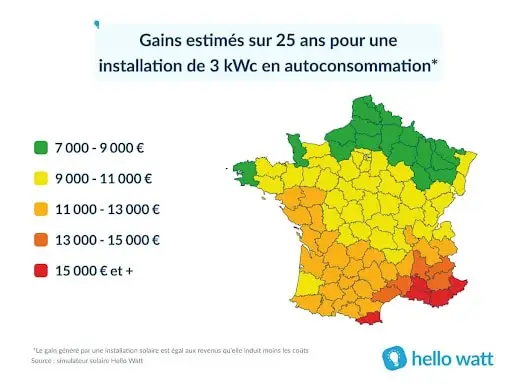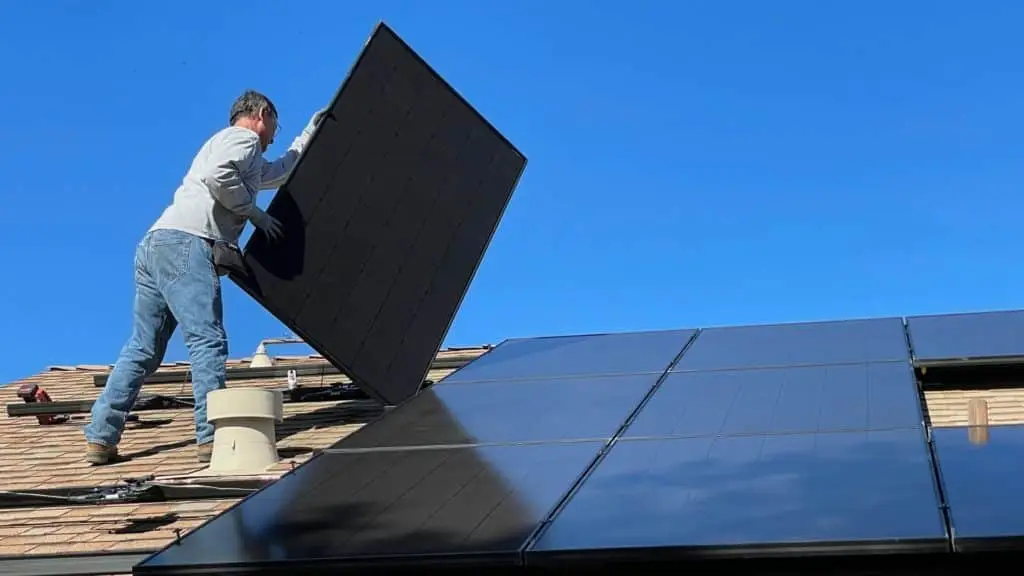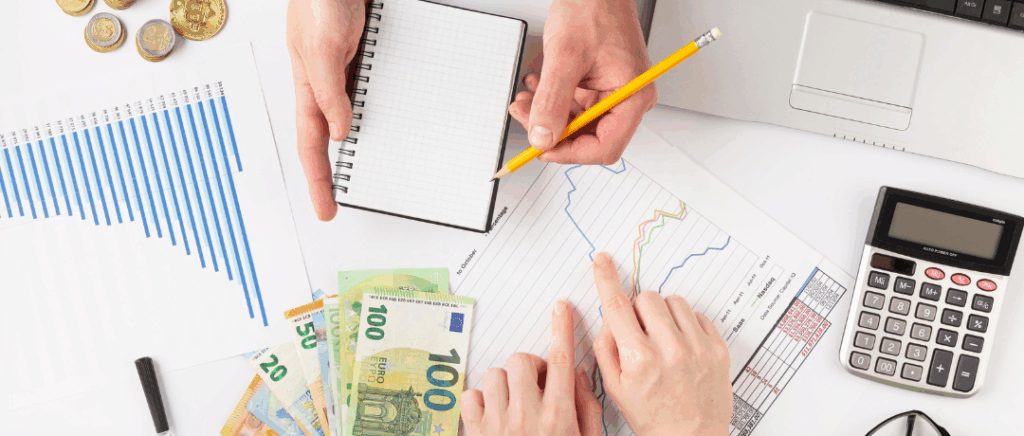Why not install photovoltaic solar panels?
With Beev, get a turnkey solar panel solution to reduce your electricity consumption.
What are the advantages of photovoltaic panels?
Photovoltaic panels are often mistakenly referred to as "solar panels". In reality, they are two different devices.
The first are made up of a multitude of photovoltaic cells, which absorb the sun's rays and convert them into electrical energy to power the home's general circuit.
Solar panels, or thermal panels, also capture the sun's energy, but transform it into heat that is used to heat the home and produce domestic hot water.
It is generally difficult to combine these two types of panel for technical and economic reasons. However, if your heating and domestic hot water system is powered by an electrical energy source, it will be much more cost-effective to opt for photovoltaic panels. That way, you can fully manage your energy production and enjoy all the benefits of self-consumption.
A still high cost
The cost of photovoltaic panels has fallen significantly. In 2024, the average price of a 1 kW photovoltaic panel is around €500 to €700, depending on the technology chosen. For a 150 m² home, the total investment (including panels, inverter and installation) is generally between €6,000 and €10,000. Installation always involves connecting the panels to an inverter, which converts the direct current produced into alternating current that can be used in the household circuit. However, inverter technologies have improved, offering greater efficiency and advanced features.
However, the principle of self-consumption can drastically reduce your electricity bill. By converting solar energy into electrical energy, you can power all your appliances: television sets, washing machines, smartphones... but also the battery of your electric car !
What's more, you'll be able to reduce your dependence on electricity suppliers and, as a result, you'll be less affected by market-indexed tariff changes that are impossible to anticipate. But that's not all: you'll also be able to resell some of the electricity you don't use.
The purchase obligation: a godsend for generating income
Over the long term, installing photovoltaic panels can generate an attractive additional income. If you don't use all the electricity generated by solar power, you can sell the surplus under the "obligation d'achat" scheme. This legislation, which has been in force since 10 February 2000, obliges electricity suppliers and distributors to buy back the energy not consumed by private individuals. The tariffs are regulated and set by government decree. In 2024, tariffs will be set by quarterly decrees, with specific values for each type of installation. For the second quarter of 2024, for example, installations ≤ 3kWp benefit from a tariff of €0.1430/kWh for the total sale. The contract between the supplier and the consumer is for 20 years. By opting to sell your electricity, you are guaranteed a fixed income for several years.

Start-up aid at national level
Photovoltaic panels make a major contribution to the development and sustainability of the energy transition. Thanks to carbon footprint close to zero, this energy source reduces greenhouse gas emissions. What's more, new production technologies and the use of 100 % recyclable materials % further limit the ecological impact. With this in mind, the government has developed a number of schemes designed to make photovoltaic panels more accessible, even to the most modest households. Under these schemes, private individuals and professionals wishing to opt for this energy source can benefit from an investment allowance, a zero-rate eco-loan, reduced VAT and various energy allowances calculated on a means-tested basis.
Investment allowance for the installation of photovoltaic panels
Since 1 January 2014, the installation of solar thermal and photovoltaic panels has no longer been eligible for tax credits. However, installations intended for self-consumption and resale (rather than pure sale) may be eligible for an investment allowance or self-consumption allowance. This varies from €80/kWp to €380/kWp, depending on the output of the installation.
For the third quarter 2024The amounts are as follows:
| Puissance de l'installation | Montant de la prime pour une installation |
|---|---|
|
Less than 3 kWp
|
260 €/kWp
|
|
Between 3 and 36 kWp
|
190 €/kWp
|
|
Between 36 and 100 kWp
|
100 €/kWp
|
Rates valid from 1ᵉʳ August to 31 October 2024
Source : Ministry of the Economy, Finance and Industrial and Digital Sovereignty.
Good to know: you can also benefit from a VAT rate of less than 10 % for the installation of photovoltaic panels with an output of 3 kWp or less.
The zero-rate eco-loan (éco-PTZ)
Note that photovoltaic panels are no longer eligible for the zero-rate eco-loan (éco-PTZ). This loan is now reserved for work aimed at directly improving the energy performance of homes, such as thermal insulation, heating or the production of domestic hot water using renewable systems (solar heating, for example).
MaPrimeRénov'
Are you thinking of installing photovoltaic panels to reduce your energy costs?
In France, there are a number of specific grants available to support your photovoltaic panel installation project. Although MaPrimeRénov' does not directly fund the installation of photovoltaic panels to produce electricity, you can benefit from other schemes tailored to this type of project.
Among the aids, the self-consumption bonus is intended for installations that consume part of the electricity produced while selling the surplus to the grid. This premium is paid by EDF OA and its amount decreases according to the power of your installation. You will also benefit from guaranteed feed-in tariffs for the resale of your surplus electricity.
These rates are regularly reviewed by the government to ensure a stable return on your investment.
What's more, for photovoltaic installations with a power output of 3 kWp or less, you can benefit from a VAT rate reduced to 10 %This reduces the total cost of your project.
Although photovoltaic panels are not eligible for MaPrimeRénov', self-consumption with resale of the surplus remains a profitable option thanks to these schemes. They allow you to make your installation profitable while contributing to the energy transition.
For more details, consult the France Renov' official website.
Local grants for financing photovoltaic panels
Le Solar plan implemented by the French government in 2018 to promote self-consumption aims to achieve an energy mix made up of of 32% of solar energy by 2030. A great deal has already been done to achieve this. Local aid is part of this approach.
If you live in certain regions or départements, you will be able to combine these additional grants with the funding schemes mentioned above. Here is the list of grants renewed in 2024.
Support for the Essonne photovoltaic panel
Launched in March 2019 at the initiative of the departmental council, the Essonne photovoltaic panel grant is designed to support residents' energy renovation projects. It is part of the 91 eco-housing bonusextended until 2024. The amount of aid can be up to 4 000 € for large-scale works, provided that the energy saving is at least 35 %. For smaller-scale work, the grant is 800 €. In all cases, the work must be aimed at significantly improving energy performance.
La 91 eco-housing bonus is also aimed at co-owners, with assistance of up to 3,750 per home for work carried out in the common areas of condominiums. In addition, a environmental bonus from 500 € can be granted to encourage the installation of solar panels, bringing the total grant to 3 800 € under certain conditions.
This aid is available without income conditions, but can be adjusted according to resources for major works.
Photovoltaic panel help from the Bourg-en-Bresse department
In Bourg-en-Bresse, support for the energy transition is called "My Energy Cap. It is financed by the Renewable Energy Fund of the CA3B (Communauté d'Agglomération du Bassin de Bourg-en-Bresse).
For the installation of photovoltaic panels, aid can be as much as at least 10% of the cost of eligible workup to a limit of 15,000 worth of workand can go as far as 25% depending on the applicant's situation.
The conditions of eligibility concern the status of owner-occupier or lessorand the type of equipment installed. One point to note is that, for certain types of older housing, the roof insulation must have been carried out in accordance with the requirements of the Energy transition tax credit 2015. The equipment must be installed by a certified professional. RGE (Recognised as an environmental guarantor).
To apply for a grant, simply visit the operation website, managed in partnership with the Ain Chamber of Trades and Craftsor on the My Energy Capwhich offers comprehensive support for energy renovation.
Photovoltaic panel support for the Grand-Est Region
- This support scheme for photovoltaics in the Grand-Est region aims to encourage self-consumption. The aid is intended for :
- professionals, associations,
- SCI,
- social landlords,
- condominiums,
- companies.
with support from 50% for large companies and up to 70% for SMEs and SMIs.
Projects must aim to achieve a self-consumption rate of more than 70%. Bonuses are available for participatory projects, up to a maximum of 40%. The application must be submitted before the start of the work via the regional platform.
Support for photovoltaic panels from La Cali
La Cali, better known as the Communauté d'Agglomération du Libournais (the urban community of the Libourne area on the right bank of Bordeaux), is offering residents and new arrivals access to a simulation of a solar energy transition project to measure the energy potential of their roof. After carrying out a simulation, users are invited to discover the various options for finalising their project (putting them in touch with professionals, advice and estimates). This service is free of charge. Residents can also apply for financial assistance, up to a maximum of 20% of the total cost of the work (capped at €2,000 for panels intended for self-consumption). The panels must be installed in homes over two years old by an RGE professional.
Support for Anor photovoltaic panels
The town of Anor intends to encourage the deployment of clean energy sources through a subsidy programme aimed at its residents. The scheme, which aims to finance part of the cost of installing photovoltaic panels, amounts to €2,700. The solar cadastre tool enables users to make a reliable assessment of the energy potential of their roof. They will then be invited to download a grant application file which can be handed in directly at the town hall.
Toulouse Métropole photovoltaic panel grant
Toulouse is heavily involved in reducing its local energy footprint, and has introduced a number of schemes to support the energy transition at both individual and global level. Since 2020, specific aid has been available to help homeowners make their installations greener, particularly in terms of electricity production. This bonus can amount to 25% of the cost of the workdepending on the nature of the project, with a ceiling of 15,000 per project.
The installations must be carried out by an RGE QualiPV-certified professionalThe grant is available to individuals, businesses and associations whose projects involve buildings more than two years old and located within the Toulouse Metropolitan Area. The amount of the subsidy is calculated on the basis of the average national cost of installations, according to ADEME. The project may involve injection or self-consumption installations on the roof, in the shade or on the ground.
Support for photovoltaic panels in Provence
Residents of the Bouches-du-Rhône department wishing to install solar systems to heat their homes are entitled to a local grant of up to 6,000 maximumThe scheme is means-tested. The household's reference tax income must be less than 55,000 for a couple or 30,000 for a single person. In certain specific cases, this ceiling may rise to 60 000 €.
Please note: this grant does not cover work on the common areas of condominiums.
What's more, photovoltaic panels used to generate electricity are not eligible to this aid, which focuses primarily on solar heating and solar water heaters.
In the Drôme, the Valence Romans conurbation is offering a grant of 750 € in the form of the Rénov' Habitat Durable grant. To qualify for this bonus, individuals must carry out a package of two works, including optimising thermal insulation and switching to a renewable energy source.
Solar thermal systems offer a forward-looking solution for heating homes more responsibly. For end users, the stakes are also economic, with local and national subsidies making it easier to finance these installations.
































